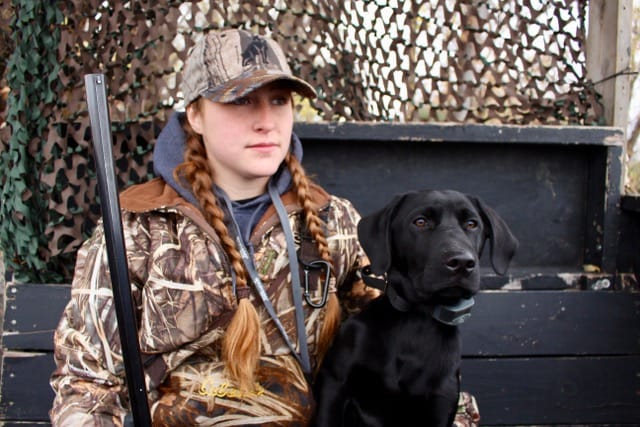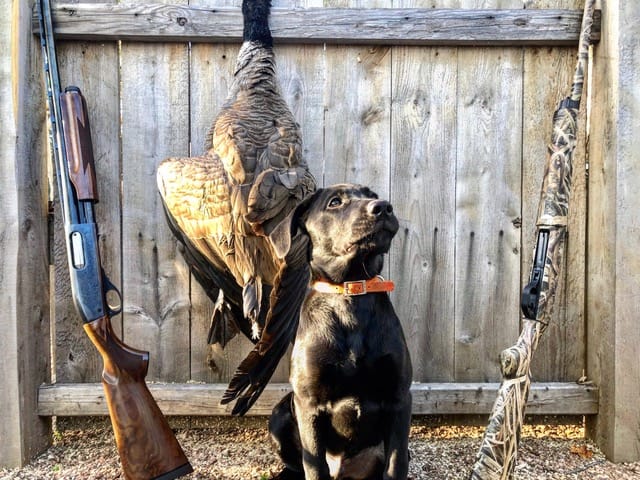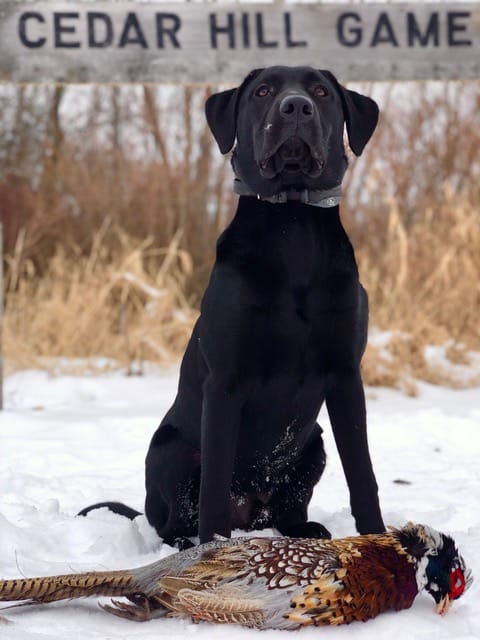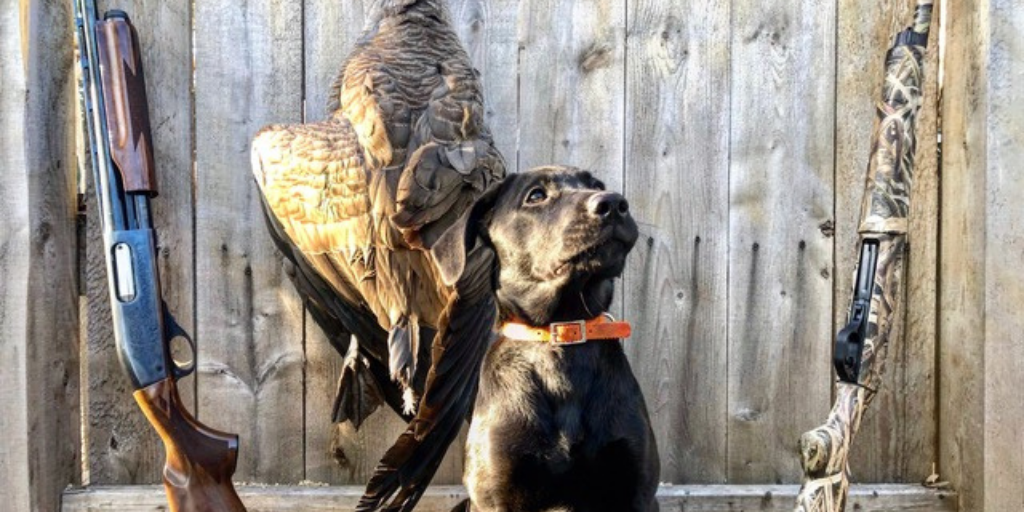Looking to learn how to train a bird dog?
My whole life I have grown up around dogs and spent time helping my Dad train our family Labradors. We never sent one to a professional trainer, as my dad always told me he finds it just as effective to use the dog’s natural instincts. Labrador retrievers are known for their long history of bird hunting and obviously, retrieving. With all of our family hunting dogs, I have witnessed and experienced how truly simple it can be to train a bird dog once YOU, the handler, learn how to work with that instinctual drive. In August of 2019, I adopted my very own black lab puppy named Goose. It has been a while since I trained up a bird dog, but Goose made me realize just how rewarding the process can be.

Introduction to Bird Dog Training: Unleashing the Potential
When it comes to training a bird dog, there’s more to it than meets the eye. It’s a captivating journey of nurturing instincts, building trust, and honing skills. Bird dog training is not just about transforming a dog into a hunting companion. It’s about unlocking their innate abilities and forming a bond that transcends the fields.
The Perfect Match: Breed Selection for Bird Dogs
Every great bird dog begins with the right breed. The world of bird dog enthusiasts encompasses a wide range of breeds, each with its own unique set of characteristics that make them exceptional hunting partners. From the energetic and versatile Labrador Retriever to the focused and steadfast German Shorthaired Pointer, the choices abound. Understanding the traits and tendencies of different breeds can help you make an informed decision that aligns with your hunting aspirations.
In the realm of bird dog training, various breeds have gained popularity due to their specific skill sets. Let’s explore a few notable contenders:
Read It Now:: Best Dog Training Collars for Effective Training
Labrador Retriever: The Versatile Companion
The Labrador Retriever, a true icon among bird dogs, has cemented its place as one of the most versatile hunting breeds. With a natural inclination for retrieving and an unwavering eagerness to please, this breed excels in both upland and waterfowl hunting. Their intelligence and trainability make them an ideal choice for novice trainers, while their gentle disposition and loyalty endear them to families as beloved companions.
German Shorthaired Pointer: The Agile Athlete
If agility and endurance are paramount, the German Shorthaired Pointer shines. This breed boasts remarkable speed, athleticism, and an innate ability to locate and point game birds. Their keen sense of smell and natural instinct to track make them adept at navigating various terrains, from dense cover to open fields. With their unwavering determination and boundless energy, they are a force to be reckoned with in the hunting world.
English Springer Spaniel: The Tenacious Flusher
The English Springer Spaniel is a breed revered for its exceptional flushing skills. Equipped with a keen nose and a knack for finding and startling game birds into flight, they excel in upland hunting. Their natural ability to locate and flush birds, coupled with their gentle nature and unwavering loyalty, makes them a popular choice among avid bird hunters seeking an enthusiastic and reliable companion.
Brittany Spaniel: The Agile All-Rounder
The Brittany Spaniel, often referred to as the “Brittany,” is a breed known for its remarkable versatility. With an inherent drive to hunt and a natural inclination for both pointing and retrieving, they are adept in a variety of hunting scenarios. The Brittany’s intelligence, agility, and willingness to please make them well-suited for hunters who desire a compact, adaptable partner that excels in both upland and waterfowl environments.
In the vast world of bird dog breeds, these are just a few notable examples. Each breed brings its unique strengths to the table, and the choice ultimately depends on the type of hunting you envision and the traits that resonate with you. Remember, finding the perfect match between breed and handler is an essential step towards a successful bird dog training journey.
Looking for the best dog breed for home protection? Check out this article.
Tips and tricks to help train up your first (or second, or third…) bird dog
Obedience
Dogs in general, especially labs, are born to please! Use that mindset when training your pup. Make lots of eye contact, use lots of small treats, and use as much praise as possible when they do the right thing. Focusing on basic obedience such as house training and “sit, lay down, stay, and come/here” commands are keys to building up a hunting dog. Goose was able to follow these commands and fetch a ball by the time he was 12 weeks old because his training was CONSISTENT, daily, and often. Use every interaction as an opportunity to train!

Practical Exercises
Take your pup out! Whether it’s for a swim or a long walk in the woods, not only are you bonding with your puppy, but you are also exposing them to the types of terrain and scents they will encounter while hunting. Buying bird scent of your choice (duck, goose, pheasant, grouse, etc…) and spreading it on a dummy or ball to throw or drag for your puppy to chase and retrieve is a great way to build their drive for birds. Another important subject to touch on is shooting…gun shy dogs can present a real problem in a hunting situation. To avoid this, try occasional target shooting with your dog present, but at a distance, and start with a low gauge/caliber gun. If possible, bring your pup to the local gun club on shooting nights to expose them to gunshots.
Training Aids
It doesn’t cost much to get the things you need to effectively train your puppy. Here is a quick list of a few things I use for Goose: Training treats, throwing dummy, tennis balls, assorted bird scent or wings saved from hunting season to wrap around throwing dummy, Sportdog Brand training collar (we started using this when he was about 5 months old), live birds (you may be able to find a dove or quail farm near you to purchase training birds).
Looking for more on hunting with dogs?
Patience
I know this is something you read in nearly every dog training article/book/website, but it is also the most important! Puppies have short attention spans, so you may need to cut training short if attention is lost, or be able to push through several failed attempts without expressing your frustrations to the pup. Keep in mind that some things will be harder for your pup to learn than others, but keep training fun and interesting, and always keep a positive attitude. Expressing anger with the puppy can only make things worse.

Today, Goose is a year and 2 months old, and he is already a beast of a bird hunter. The following few weeks after getting him, I spent at least 1 cumulative hour a day on obedience training such as following commands, waiting for his food, and housebreaking. By 3 months old, he came to North Dakota with my Dad and me on a duck hunting trip and was eager to follow around our older, more seasoned labs, and had his first water retrieve. At 5 months old we took him to game farms to pheasant hunt, and he found 100% of our paid for birds. Why am I telling you this? Because it’s all about exposure. Your puppy will only be as good as you want if you give him/her the opportunity to learn, make mistakes, and most importantly, have fun doing what their breed was born to do.
The Art of Retrieving: Techniques that Fetch Results
Retrieving is a fundamental skill for a bird dog. Teaching your canine companion to fetch objects lays the groundwork for their future success in the field. Here are three effective techniques to incorporate into your bird dog’s training regimen:
Dummy Training
Start by introducing your dog to retrieving using dummies or retrieving bumpers. These specialized training tools resemble birds or small game, and they allow your pup to practice picking up and delivering objects without harming real birds. Begin by tossing the dummy short distances and gradually increase the distance as your dog becomes more comfortable. Encourage them to retrieve and praise their success.
Scent Training
A crucial aspect of retrieving is teaching your bird dog to follow scents. Introduce the concept of scent by attaching a small bird wing or using bird scent products to the dummy. This helps associate the scent of game birds with the act of retrieving. Start by allowing your dog to sniff the scent and then hide or throw the scented dummy for them to find and retrieve. This exercise enhances their natural instincts and strengthens their ability to track game.
Introducing Live Birds
Once your dog has progressed in their training, it’s time to introduce live birds. This step should be approached with caution and consideration for the bird’s safety. Use game farm-bred birds or seek guidance from professional trainers to ensure humane practices. Start with clipped wings to limit flight and provide a controlled environment. Gradually increase the complexity of the retrieves, encouraging your dog to flush and retrieve the birds. This hands-on experience is invaluable for honing their hunting skills.
By incorporating these retrieving techniques into your training routine, you’ll help your bird dog develop the necessary skills and instincts to excel in the field.
Training a Bird Dog: Overcoming Challenges
Training a bird dog is an exhilarating journey filled with triumphs, but it’s not without its fair share of challenges. From distractions to disobedience, each dog presents unique hurdles to overcome. In this section, we’ll address common issues that may arise during bird dog training and provide practical tips for troubleshooting.
Tackling Distractions: Focusing Amidst Temptations
Distractions can pose a significant challenge during bird dog training. Dogs, especially those with a keen sense of smell and a curious nature, can easily get sidetracked by scents, sounds, or other animals. To combat distractions, follow these tips:
- Gradual Exposure: Introduce distractions gradually, starting with controlled environments. Increase the level of distraction over time as your dog becomes more focused and reliable in their obedience training.
- Positive Reinforcement: Use high-value treats and plenty of praise to reinforce desired behaviors. Reward your dog for maintaining focus and resisting distractions. This helps them associate focus and obedience with positive experiences.
- Redirect and Refocus: If your dog gets distracted, calmly redirect their attention back to you and the task at hand. Use cues or commands they are familiar with to regain their focus.
By consistently working on focus and gradually exposing your dog to distractions, you’ll help them develop the ability to concentrate even in the most tempting situations.
Dealing with Disobedience: Communication and Consistency
Disobedience is another hurdle to overcome in bird dog training. Dogs may test boundaries or exhibit stubbornness, making it important to address the issue promptly and effectively. Consider the following strategies:
- Clear Communication: Ensure your commands are clear, concise, and consistently reinforced. Use a firm, but not harsh, tone of voice to convey your expectations. Avoid confusing or conflicting commands that may lead to disobedience.
- Consistency: Dogs thrive on routine and consistency. Maintain a structured training schedule and enforce rules consistently. Reinforce desired behaviors and promptly correct any disobedience.
- Positive Reinforcement: Focus on rewarding good behavior rather than solely punishing disobedience. Use treats, praise, and playtime as positive reinforcement tools to motivate and encourage your dog to comply with commands.
By establishing clear communication, maintaining consistency, and utilizing positive reinforcement techniques, you’ll be on your way to overcoming disobedience challenges during training.
Unlocking the Retrieve: Strategies for Success
Difficulty in retrieving can be a common stumbling block during bird dog training. Some dogs may be hesitant or reluctant to fetch objects, hindering their progress in becoming proficient retrievers. Here are some techniques to encourage and improve the retrieve:
- Patience and Persistence: Retrieving may not come naturally to all dogs, so patience is key. Break down the retrieve into smaller steps and reward incremental progress. Celebrate even the smallest efforts to build your dog’s confidence.
- Retrieving Games: Make retrieving fun and engaging by incorporating games. Use toys or dummies that your dog enjoys and gradually increase the complexity of the retrieves. Play interactive games that involve fetching and returning objects to you.
- Scent Association: Enhance the retrieve by associating scents with the objects. Introduce bird scent or hide scented objects to pique your dog’s interest and strengthen their drive to retrieve.
- Retrieve with a Purpose: Connect the retrieve to real-life hunting scenarios. Start with simple retrieves in familiar environments, then progress to more challenging situations. By making the retrieve meaningful, your dog will understand its importance in the hunting context.
With consistent practice, patience, and creative approaches, you can overcome difficulties in retrieving and unlock your bird dog’s full potential.
A Healthy Bird Dog: Nutrition, Exercise, and Care
A crucial aspect of training a bird dog goes beyond obedience and retrieving skills. It lies in ensuring the health and well-being of your loyal companion. In this section, we’ll explore the vital role of nutrition, exercise, and regular veterinary care in maintaining a robust and thriving bird dog.
The Power of Nutrition: Fueling Optimal Performance
Proper nutrition plays a pivotal role in supporting your bird dog’s overall health and performance. Just like athletes, these energetic canines require a well-balanced diet to fuel their active lifestyle. Here’s what you need to know:
- Quality Ingredients: Choose high-quality dog food specifically formulated for active breeds. Look for brands that prioritize animal-based proteins, healthy fats, and essential nutrients.
- Protein for Muscle Development: Protein is vital for muscle growth and repair. Ensure your dog’s diet includes sufficient amounts of lean meat, fish, or poultry as a source of quality protein.
- Healthy Fats: Healthy fats, such as omega-3 fatty acids, promote optimal brain function and coat health. Incorporate sources like fish oil or flaxseed into your dog’s diet.
- Carbohydrates for Energy: Carbohydrates provide the necessary energy for your bird dog’s active lifestyle. Opt for complex carbohydrates like whole grains and vegetables.
- Hydration: Always provide fresh water for your dog to prevent dehydration, especially during training sessions or outdoor activities.
Remember, consult with your veterinarian to determine the appropriate portion sizes and feeding schedule based on your dog’s age, breed, and activity level. Regular monitoring of your bird dog’s weight and adjusting their diet accordingly is essential for maintaining optimal health.
Exercise: Key to Physical and Mental Well-Being
Exercise is not only crucial for physical fitness but also for the mental well-being of your bird dog. Engaging in regular physical activities helps release excess energy and promotes a balanced temperament. Consider the following:
- Daily Exercise Routine: Establish a consistent exercise routine that includes activities like brisk walks, jogging, swimming, or retrieving exercises. Aim for at least 30 minutes to an hour of exercise per day, depending on your dog’s age and breed.
- Mental Stimulation: Engage your bird dog in mental exercises to keep their minds sharp. Puzzle toys, scent games, and obedience training sessions can provide the mental challenges they need.
- Variety and Socialization: Vary the types of exercise and introduce new environments to keep things interesting for your bird dog. Socialize them with other dogs and people to foster their social skills.
By providing regular exercise and mental stimulation, you’ll not only enhance your bird dog’s physical fitness but also strengthen the bond between you and your canine companion.
Veterinary Care: Ensuring Longevity and Well-Being
Regular veterinary care is essential for maintaining the long-term health and well-being of your bird dog. Here are some key aspects to consider:
- Vaccinations and Preventive Care: Keep your bird dog up to date on vaccinations and preventive treatments for parasites, such as fleas, ticks, and heartworm. Consult with your veterinarian to establish an appropriate vaccination and preventive care schedule.
- Annual Check-ups: Schedule annual wellness exams to assess your dog’s overall health, identify any potential issues early on, and receive professional guidance on nutrition and training.
- Dental Health: Pay attention to your bird dog’s dental hygiene. Regular brushing, dental treats, and annual dental cleanings can help prevent dental diseases.
- Spaying or Neutering: Consider spaying or neutering your bird dog unless you plan on breeding. This procedure can prevent certain health issues and unwanted behaviors.
Remember, your veterinarian is your partner in ensuring the well-being of your bird dog.
Here are some answers to your most common questions on how to train a bird dog:
What breeds are commonly used as bird dogs?
Bird dogs are commonly trained from breeds such as Labrador Retrievers, German Shorthaired Pointers, English Setters, Brittany Spaniels, and Pointers.
How do I choose the right breed for bird dog training?
When choosing a breed for bird dog training, consider factors such as the breed’s temperament, energy level, size, hunting instincts, and compatibility with your lifestyle and hunting preferences.
What are some tips for training a bird dog in obedience?
To train a bird dog in obedience, establish a consistent routine, use positive reinforcement techniques, break training into manageable steps, be patient and persistent, and seek professional guidance if needed.
What are practical exercises I can do with my bird dog to build their hunting skills?
Practical exercises to build hunting skills include scent training, introducing birds, practicing retrieves, fieldwork with simulated hunting scenarios, and gradually exposing the dog to different hunting environments.
What training aids are recommended for bird dog training?
Recommended training aids for bird dog training include bird launchers, scent dummies, check cords, retrieving bumpers, training collars, whistles, and training scents.
How can I address distractions during bird dog training?
To address distractions during bird dog training, start in a controlled environment, gradually increase distractions, use positive reinforcement to redirect focus, and reinforce basic commands in different scenarios.
What should I do if my bird dog shows disobedience during training?
If a bird dog shows disobedience during training, stay calm and assertive, review basic commands, reinforce training fundamentals, adjust training methods if necessary, and consult a professional trainer for guidance.
What techniques can I use to improve my bird dog’s retrieving skills?
To improve retrieving skills, utilize positive reinforcement, introduce retrieving drills, gradually increase difficulty, encourage natural instincts, use retrieving bumpers or dummies, and establish a consistent training routine.
How important is nutrition for a bird dog’s performance?
Nutrition plays a crucial role in a bird dog’s performance. Provide a balanced diet rich in high-quality protein, healthy fats, and essential nutrients to support energy levels, muscle development, and overall health.
What kind of exercise routine is recommended for a bird dog?
A bird dog should have a regular exercise routine that includes daily walks, free playtime, structured training sessions, and opportunities for mental stimulation. The routine should be tailored to the dog’s age, breed, and energy level.
How can I provide mental stimulation for my bird dog?
To provide mental stimulation, incorporate puzzle toys, interactive games, scent work, obedience training, retrieving exercises, and regular exposure to new environments and experiences.
What is the importance of regular veterinary care for a bird dog?
Regular veterinary care is essential for a bird dog’s health and well-being. It includes vaccinations, preventive treatments for parasites, routine check-ups, dental care, and early detection of any health issues to ensure optimal performance and longevity.
Bottom Line? Instinct is what makes your puppy the bird dog that it will grow up to be. Your puppy wants to make you happy…let it. They to be praised…reward it. Your puppy wants to explore…take it out. Your puppy wants to smell things…give it a scent to follow.
And always remember, your dog doesn’t just work for you, you work for your dog as well. What are your tips for training a bird dog?
Miss Pursuit is a participant in the Amazon Associates Program. Miss Pursuit may earn a small commission for our endorsement, recommendation, testimonial and/or link to any products or services from this website. Your purchase helps support our work in bringing you real information about hunting and the outdoors.




Is it unreasonable to train a 2yo? My family and I are wanting to get into camping and hunting. As it is she’s a very quiet docile yet energetic girl. She follows basic commands fetches pretty well but dislikes heavier things. She will usually pick up the heavy toy jump a few steps and drop it. , but goes a little nuts, but not too far if she gets out off leash. On leash she tends to pull when I’m with the kids, but leaves slack when it’s just us. If she were to be a bit gun shy, could this be remedied with time and exposure? Or would she just be considered a poor choice for accompanying/ aiding in hunting?